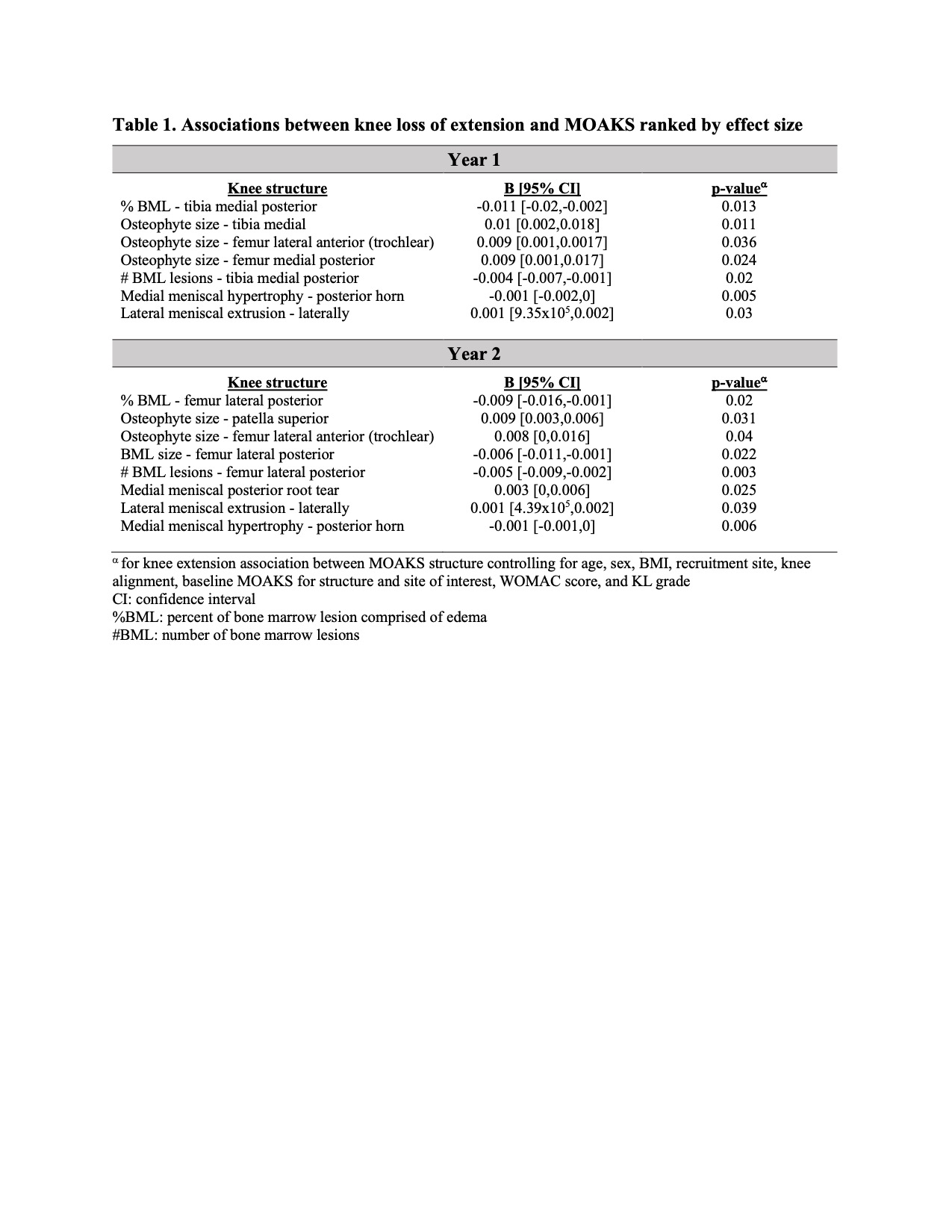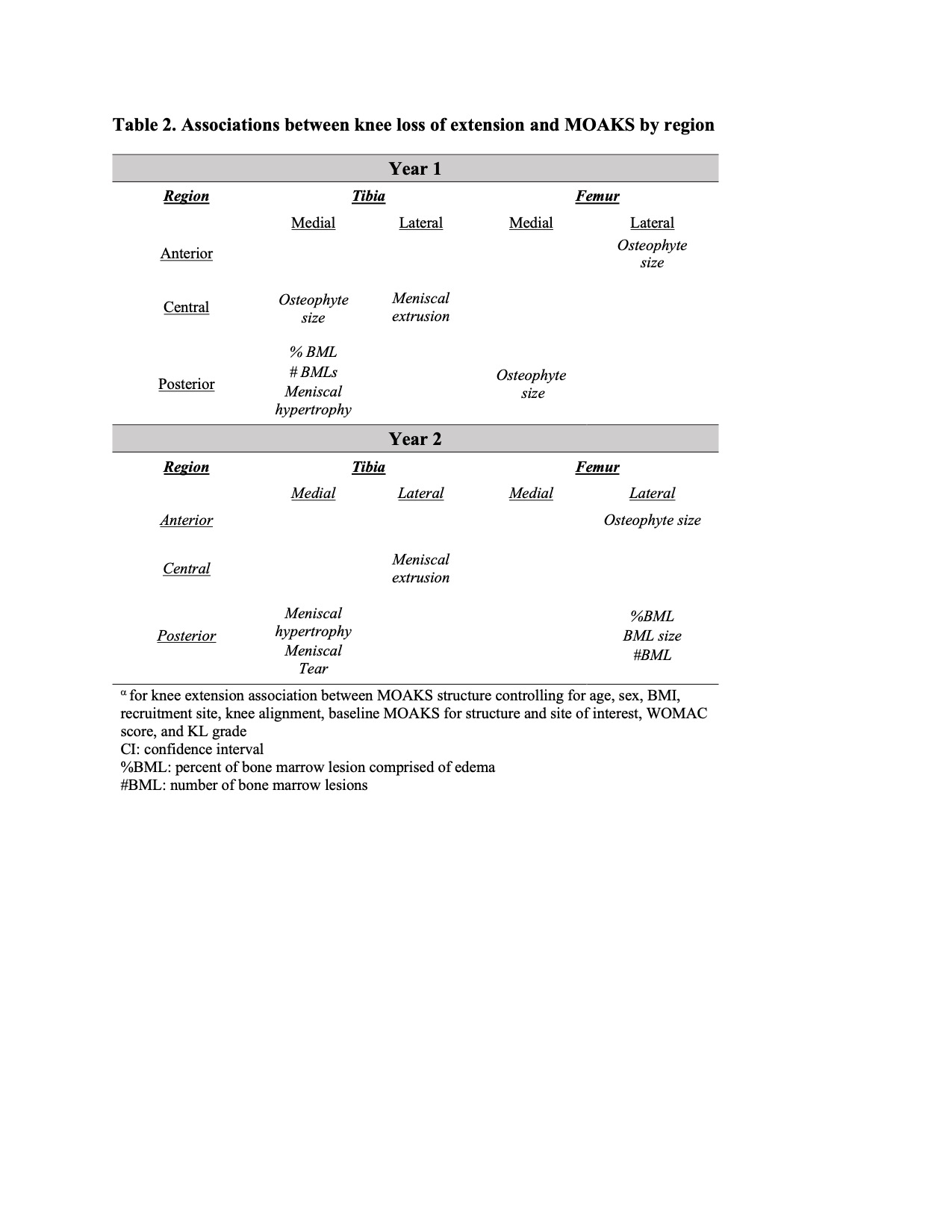Session Information
Session Type: Poster Session C
Session Time: 9:00AM-11:00AM
Background/Purpose: Knee flexion contracture (FC) is associated with worse clinical outcomes in those with knee OA. Cross sectional data demonstrated that knee FC was associated with non-specific widespread MRI degenerative changes1. To our knowledge, there have been no longitudinal studies evaluating the association between knee FC and MRI-visualized OA-associated structural changes.
The purpose of this study is to determine whether baseline knee extension is associated with longitudinal knee structural changes on MRI, using data from the Osteoarthritis Initiative.
Methods: Retrospective cohort analysis using data from all 596 participants of the Foundation for the National Institutes of Health subset for whom knee extension and years 1 and 2 MRI data were available (1 knee/participant). MRIs were scored using the semi-quantitative MRI OA Knee Score (MOAKS). Participant demographics, body mass index (BMI), recruitment site, and baseline knee alignment and maximal extension were obtained. Baseline Kellgren Lawrence (KL) grade, and Western Ontario McMaster Osteoarthritis (WOMAC) Index score were also collected.
Univariate general linear model with analysis of covariance (ANCOVA) was performed to assess the association between baseline clinical knee extension (degrees) and MOAKS structural scoring at years 1 and 2, correcting for relevant clinical factors.
Results: Participant mean age was 61.5±8.9 years, BMI 30.7±4.9, mean KL grade 2.24 valgus 0.65, WOMAC total 12.7, with 58.7% being female. Max knee extension was 0.25±3.97°, alignment 0.34 valgus±3.68°.
Tables 1 and 2 summarize the associations between knee extension and MOAKSs pathologies by effect size and region at years 1 and 2.
Conclusion: Knee FC is associated with multiple OA structural pathologies at 1 and 2 years, with an anatomic predisposition to the posterior knee. At both years 1 and 2, osteophyte size at the lateral femur trochlea, lateral meniscal extrusion and medial meniscal posterior horn hypertrophy were consistently associated with baseline loss of knee extension. Further studies evaluating structural change mechanisms and potential early therapeutic interventions once a knee FC is detected are needed.
References
- Campbell TM, Trudel G, Conaghan PG, Reilly K, Feibel RJ, McGonagle D. Flexion contracture is associated with knee joint degeneration on magnetic resonance imaging: data from the Osteoarthritis Initiative. Clin Exp Rheumatol. 2022 May;40(5):993-998. doi: 10.55563/clinexprheumatol/u8itzf. Epub 2021 Nov 3. PMID: 34796841.
To cite this abstract in AMA style:
Chan Chun Kong D, Conaghan P, Campbell M. Is Flexion Contracture in Knee Osteoarthritis Associated with MRI Pathologies over Time? Data from the Osteoarthritis Initiative [abstract]. Arthritis Rheumatol. 2023; 75 (suppl 9). https://acrabstracts.org/abstract/is-flexion-contracture-in-knee-osteoarthritis-associated-with-mri-pathologies-over-time-data-from-the-osteoarthritis-initiative/. Accessed .« Back to ACR Convergence 2023
ACR Meeting Abstracts - https://acrabstracts.org/abstract/is-flexion-contracture-in-knee-osteoarthritis-associated-with-mri-pathologies-over-time-data-from-the-osteoarthritis-initiative/


